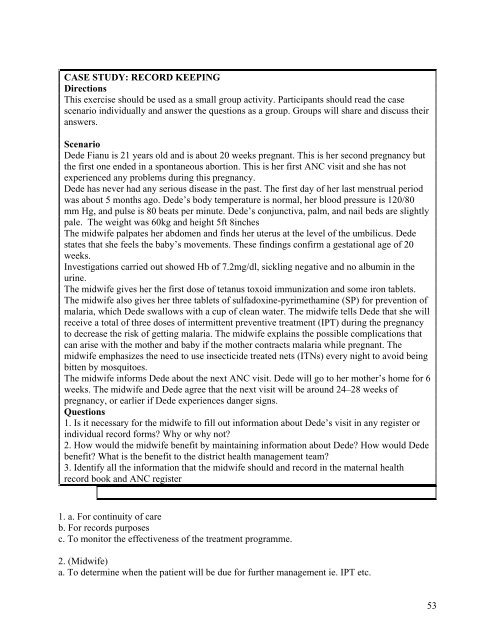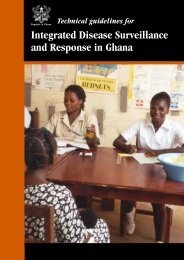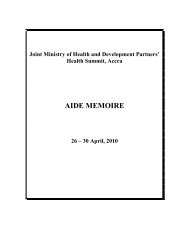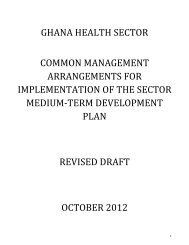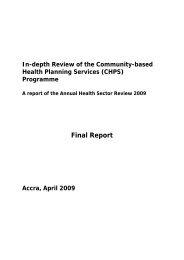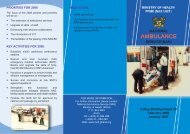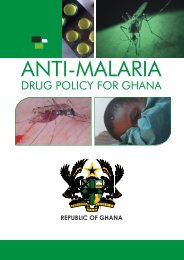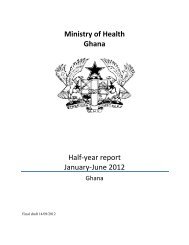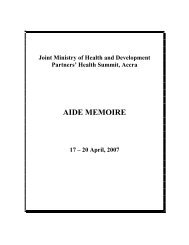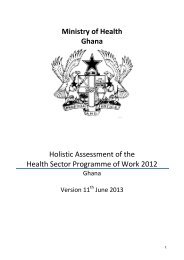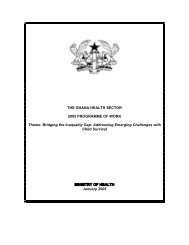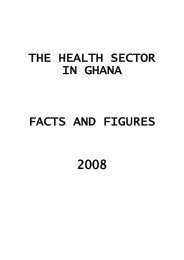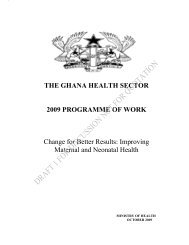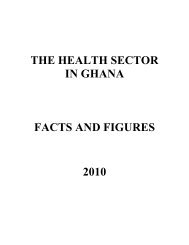Training Manual for Preventive Malaria - Ministry of Health
Training Manual for Preventive Malaria - Ministry of Health
Training Manual for Preventive Malaria - Ministry of Health
You also want an ePaper? Increase the reach of your titles
YUMPU automatically turns print PDFs into web optimized ePapers that Google loves.
CASE STUDY: RECORD KEEPING<br />
Directions<br />
This exercise should be used as a small group activity. Participants should read the case<br />
scenario individually and answer the questions as a group. Groups will share and discuss their<br />
answers.<br />
Scenario<br />
Dede Fianu is 21 years old and is about 20 weeks pregnant. This is her second pregnancy but<br />
the first one ended in a spontaneous abortion. This is her first ANC visit and she has not<br />
experienced any problems during this pregnancy.<br />
Dede has never had any serious disease in the past. The first day <strong>of</strong> her last menstrual period<br />
was about 5 months ago. Dede’s body temperature is normal, her blood pressure is 120/80<br />
mm Hg, and pulse is 80 beats per minute. Dede’s conjunctiva, palm, and nail beds are slightly<br />
pale. The weight was 60kg and height 5ft 8inches<br />
The midwife palpates her abdomen and finds her uterus at the level <strong>of</strong> the umbilicus. Dede<br />
states that she feels the baby’s movements. These findings confirm a gestational age <strong>of</strong> 20<br />
weeks.<br />
Investigations carried out showed Hb <strong>of</strong> 7.2mg/dl, sickling negative and no albumin in the<br />
urine.<br />
The midwife gives her the first dose <strong>of</strong> tetanus toxoid immunization and some iron tablets.<br />
The midwife also gives her three tablets <strong>of</strong> sulfadoxine-pyrimethamine (SP) <strong>for</strong> prevention <strong>of</strong><br />
malaria, which Dede swallows with a cup <strong>of</strong> clean water. The midwife tells Dede that she will<br />
receive a total <strong>of</strong> three doses <strong>of</strong> intermittent preventive treatment (IPT) during the pregnancy<br />
to decrease the risk <strong>of</strong> getting malaria. The midwife explains the possible complications that<br />
can arise with the mother and baby if the mother contracts malaria while pregnant. The<br />
midwife emphasizes the need to use insecticide treated nets (ITNs) every night to avoid being<br />
bitten by mosquitoes.<br />
The midwife in<strong>for</strong>ms Dede about the next ANC visit. Dede will go to her mother’s home <strong>for</strong> 6<br />
weeks. The midwife and Dede agree that the next visit will be around 24–28 weeks <strong>of</strong><br />
pregnancy, or earlier if Dede experiences danger signs.<br />
Questions<br />
1. Is it necessary <strong>for</strong> the midwife to fill out in<strong>for</strong>mation about Dede’s visit in any register or<br />
individual record <strong>for</strong>ms? Why or why not?<br />
2. How would the midwife benefit by maintaining in<strong>for</strong>mation about Dede? How would Dede<br />
benefit? What is the benefit to the district health management team?<br />
3. Identify all the in<strong>for</strong>mation that the midwife should and record in the maternal health<br />
record book and ANC register<br />
1. a. For continuity <strong>of</strong> care<br />
b. For records purposes<br />
c. To monitor the effectiveness <strong>of</strong> the treatment programme.<br />
2. (Midwife)<br />
a. To determine when the patient will be due <strong>for</strong> further management ie. IPT etc.<br />
53


